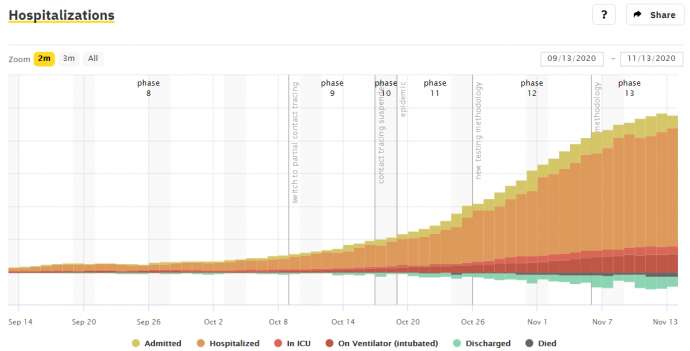STA, 13 November 2020 - A total of 38 Covid-19 patients died in Slovenia on Thursday. 1,508 new coronavirus infections were confirmed in 5,762 tests, a drop from 1,925 the day before when more tests were performed, show fresh official data. The number of hospitalisations dropped slightly.
There are currently 1,199 patients in hospital compared to 1,210 on Wednesday, of whom 200 are in intensive care, the same as the day before. A total of 79 were discharged home on Thursday, the government announced on Twitter.
Also today - Slovenia's New Covid Restrictions Come into Force, Longer Travel Red List
The national death toll currently stands at 724, according to the tracker Covid-19 Sledilnik.
The rolling 14-day average of infections per 100,000 residents has fallen to 948. The share of positive tests was 26.2%.
Slovenia has so far confirmed 52,378 cases, of which just under 20,000 are currently active.
The R value remains below 1, meaning "that ten newly infected persons pass on the virus to merely nine other persons", government spokesman Jelko Kacin told today's daily briefing, adding that changes in the testing protocol had not affected the R value and its decline.
He pointed out that the positivity rate was more than 2 percentage points lower than the day before.
The rolling 14-day average per 100,000 residents in the Pomurska region in the north-east remains cause for concern, with the figure standing at 1,493. The situation in the northern Gorenjska region has slightly improved, with the average falling below 1,400 from almost 2,000.
The only other region that has the figure above 1,000 is Koroška. The situation is best in the coastal Obalno-Kraška region (387).
Kacin also pointed out that significantly lower daily case counts were expected on Sunday and Monday, saying that the spread of coronavirus had been slowing down.
When it comes to hospitalisations, the situation is still alarming and shows a delay in new cases translating into hospital admissions, noted Kacin, also warning that the virus had been spreading in care homes.
He highlighted there was enough beds, but a shortage of staff trained to treat Covid-19 patients remained a problem.
Moreover, the number of patients with life-threatening Covid-19 at UKC Ljubljana is growing, he said.
The spokesman urged citizens to heed prevention protocols especially in the light of coming Saint Martin's day celebrations, which he said should be restricted to family members.
Matjaž Jereb, the head of the intensive care unit at UKC Ljubljana's infectious diseases department, said that the situation in hospitals was indeed critical and it was not the time to loosen restrictions.
Jereb, who is also the national ICU beds coordinator, pointed out that Slovenia had boosted the number of hospital beds, including ICU beds.
"In the past week, the past fortnight, we've been close to maximum capacity," he said, highlighting that Slovenia could provide up to 250 ICU beds and that it had been running low on hospital staff, many of whom, particularly nurses, have been infected with the virus.
In UKC Ljubljana, Slovenia's central hospital, there are currently more than 260 staff members quarantining. Most got infected outside work, according to Jereb.
Projections show that the number of active infections ranges from 17,000 to more than 80,000, he said.
The Covid-19 mortality rate is slightly below 15% in Ljubljana intensive care units, which compares to some 30% in the first epidemic wave, Jereb said, warning that the second wave had not been letting up in regard to hospitalisation figures.
The mortality rate is ten times the mortality rate associated with flu and same goes for the number of ICU patients, he said.






